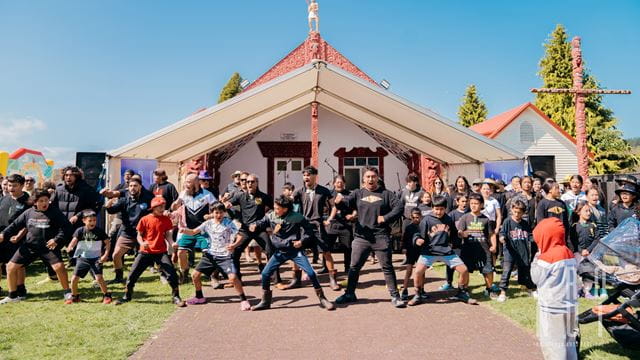27 Nov 2023

The first Aronui Arts festival in Rotorua took place in Te Māhuru (across the month of September) 2019. It was a fantastic hit that drew on the cultural richness of Te Arawa and Te Rotoruanui-a-kahumatamomoe. In 2020, Covid-19 happened.
Cian Elyse White is the Founding Festival Director for Aronui Arts Festival Charitable Trust. Forming the trust was the first step in ensuring the sustainability of the festival, which is now an annual event showcasing Indigenous artists and their unique voices with te ao.
Aronui is one of the arts festivals that has received support from the Māori Arts Festival Capability Fund, designed to support organisers of Māori arts festivals and hui ahurei to build and strengthen the skills and experience of their teams or organisations to continue to deliver festival programmes that celebrate ngā toi Māori with wider audiences.
The funding is part of a one-off allocation from Manatū Taonga Ministry for Culture and Heritage as part of its Arts and Culture COVID Recovery Programme, to help address the continued effects of COVID-19, provide employment and skills development opportunities for artists and celebrate the unique stories, arts and regional identities of regions around Aotearoa.
“Covid-19 demonstrated the power of art and its ability to act as a rongoā for whānau during trying times. The Aronui audience stayed with us during lock-down via our online programme, and came back ā-tinana (in-person) to the festival after lockdown,” says Cian. “We want to continue to create opportunities for people to experience Indigenous arts here in the regions- in their own backyard.”
“The Rotorua community has well and truly embraced Aronui. Now is the time to focus on our foundations and build our capability, so we can be equipped to continue to serve the Rotorua community into the future. We’re still a young trust, navigating the application of the Board’s policies, working on the best team structure and finally, settling into our permanent whare 'Te Takapū o Te Arawa' alongside other Māori businesses from the region."
Aronui feels responsible for the experience of its audiences, whose expectations have grown with the festival’s success.
“Aronui needs a robust and dedicated operational team, due to the exponential growth we have experienced since launching in 2019. Our festival during Te Māhuru- September 11-2023), saw the participation of 800+ Indigenous artists (including 500 kaihaka from ages 4- 90 participating in Te Ahurei ā Ngāti Pikiao) and over 8,000 audience members to one of our 14 activations across the 2 week programme. Growth is a good problem to have! Now, Aronui looks to move beyond the volunteer based operation model, building capacity locally, which will eventuate in further job creation and resource development".
Another recipient of the Māori Arts Festival Capability Funding is Toi Kiri, held annually in Mount Maunganui.

“Toi Kiri is an indigenous festival model focused on Tā Moko and embodying all Toi Māori,” says Julie Paama-Pengelly, Chair of Te Tuhi Māreikura Trust in Tauranga that established the annual Toi Kiri festival five years ago.
Toi Kiri includes three days of public festival with demonstrations and performances as part of a longer programme of symposia, workshops, and knowledge sharing. Artists come from indigenous communities across the world, all at different stages of revitalising their unique cultural practices.
“We engage mana whenua to deliver the festival, it’s run adjacent to the marae. We embrace our international guests and our festival visitors in an indigenous space where art and cultural practices are integral to who we are,” Julie says.
“We’ll use the capability funding to develop our audience, to give visitors the chance to see the world through our eyes and let them know this experience is for them. We want to grow our skills in planning and public relations and use media to tell our story.”
All the recipient Māori Arts Festival organisations have goals that reflect Creative New Zealand’s Te Hā o ngā Toi Māori Arts Strategy, to advance the practice of ngā toi Māori, increase public engagement, and build a stronger sector to advance ngā toi Māori aspirations.
The one-off festivals capability funding was awarded to 21 Māori and Pasifika festivals from across Aotearoa.
$1,818,591.50 total funding was requested
$1,564,180 total funding awarded
The funded festivals are:
- Te Kiato Limited for Rātā – Northland $87,400
- Hawaiiki Tū Productions Limited for AUTAIA – Auckland $59,240
- Polynesian Entertainers Limited – Auckland $66,560
- The Polyfest Trust – Auckland $75,000
- Auau Enua Mangaia Association of New Zealand Incorporated – Auckland $5,000
- Fe'unu Koula Global Academy of Tongan Arts Dance and Culture Ltd – Auckland $72,000
- Pasifika in the Bay Trust – Tauranga $75,000
- Te Tuhi Mareikura Trust for Toi Kiri – Tauranga $75,011
- Rotorua Pacific Islands Development Charitable Trust – Rotorua $60,000
- Aronui Arts Festival – Rotorua $159,671
- Fale Pasifika Horowhenua – Horowhenua $75,000
- Māoriland Charitable Trust for Māoriland Film Festival – Horowhenua $75,000
- Le Moana – Porirua $75,000
- CreekFest – Porirua $65,000
- Wellington Northern Region Polyfest Trust – Porirua $53,000
- The Hutt Valley Schools HuttFest Trust – Lower Hutt $75,000
- Kalia – Blenheim $74,800
- Niu Economic and Enterprise Development Trust – Canterbury $65,000
- Aoraki Pasifika Festival – Timaru $73,650
- Te Mana Ahua Ake Charitable Trust – Dunedin $78,750
- Mīharo Murihiku Trust for Mīharo Murihiku Festival – Southland $119,098

